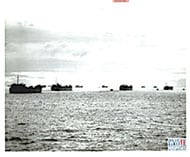In a northerly direction, black clouds swirled. It was hurricane weather.
The war was going poorly for our allies so we shipped out despite foul weather.
Huge swells pounded the hulls, plunging our ships from towering peaks into deep crevasses, soldiers on board clogging the rail, heaving up their K-rations. The LST creaked and groaned so loud we hoped it would not split amidships. With our deck awash I was assigned guard duty.
When a periscope was sighted in mid-Atlantic four destroyers went into action. A Liberty ship loaded to the gunnels with ammunition exploded into a towering fireball off our starboard beam. Dead ahead, a destroyer dropped depth charges causing massive geysers. The attack lasted thirty minutes. Strapped into my 20 millimeter gun mount it was a frightening experience. Another Liberty ship went down. A submarine surfaced and was attacked and sunk.
Convoys are prohibited from stopping to pick up survivors. Ships dead in the water are easier targets. You think of the mothers and fathers of the men floating in the middle of the ocean. You think about sharks. In boot camp we never trained for real battles. Tears flood easily.
We passed though the Straits of Gibraltar into the Mediterranean. The horn above my bunk sounded. Dawn maybe two miles off the coast of Africa, Stukas and Messerschmitts streaking over our convoy, machine guns chattering with bullets ricocheting off the metal deck.
My duty station was strapped into a 20 millimeter gun mount, firing at flaming tail pipes as the planes flew over. My loader was hit by a piece of shrapnel, his blood spurting on me and the shell canister. I felt sweat running down my ribcage. The attack lasted several minutes.
Boot camp didn’t warn me about the reality of war.
The next year was a blur of ferrying fuel to Tito’s troops in Yugoslavia, invasions along the Italian coast hopeful our hulls would deflect coastal batteries, transporting Nazi prisoners to Tunisia for internment. After a year we finally got a week of R&R on Capri.
Flying high above US naval movements in the Mediterranean was Axis Charley, a Nazi spy plane observing our every move. The plane stayed just out of range of our big guns. Occasionally it was fun to see P-38’s chase Charley back to Northern Italy where the Axis still controlled.
An invasion of Southern France was the last battle in the Mediterranean. The Riviera assault was not as difficult as Normandy. Germany had too few gun emplacements to defend against the invading fleet.
Within a few days the Southern France coast was clear of danger.
General George Patton stated, “War is hell.” I was fortunate. My only brother was killed in action. He was a paratrooper in the 101st Airborne Division and died December 19th in 1944, in the Battle of the Bulge, in Belgium. In January he would have become 21 years old.
After the war in Europe was over I was assigned to a ship scheduled to invade Japan. Thanks to President Harry S. Truman, that invasion was unnecessary.
York is a WW II navy veteran and retired President of York Furs in Buckhead. You can reach Bill York by email: Sioux2222@gmail.com.


